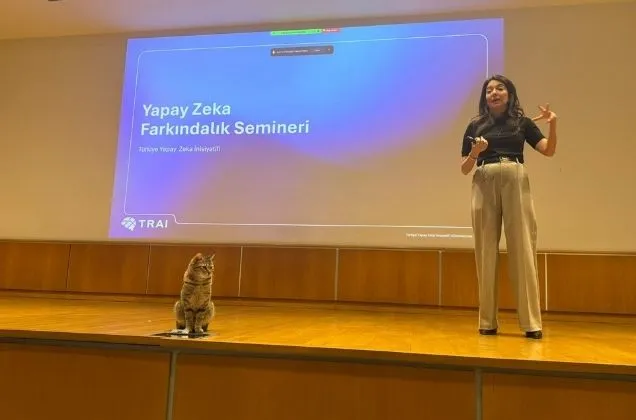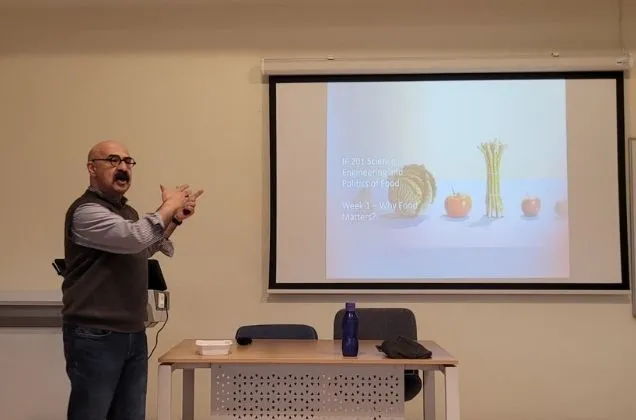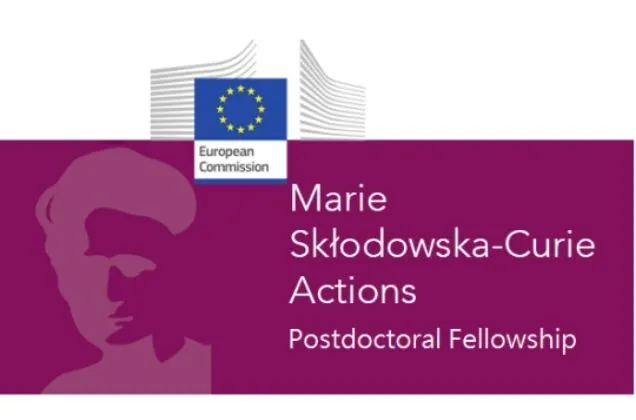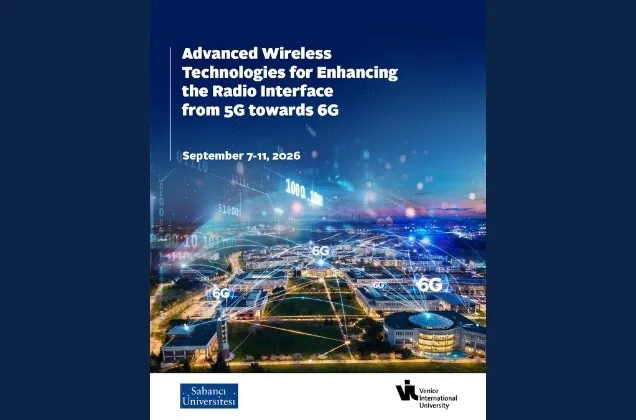06/02/2025
Our Sabancı University Electronics Engineering graduate Eşref Türkmen answered our questions about his education, career journey, and new venture.
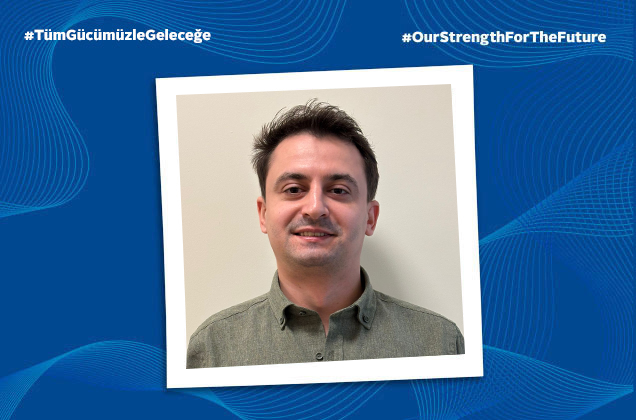
Can you tell us about the education you received at Sabancı University?
I completed my undergraduate education in 2015 in the Department of Electronics and Communication Engineering at ITU. Then, I started the integrated doctorate program at the Department of Electronics Engineering at Sabancı University. A year later, I transferred to the master's program in line with my own goals and completed it in two years. Thus, my educational journey at Sabancı University lasted three years.
How do you think Sabancı University's most important differences from other universities, "freedom to choose a program" and "liberal approach", make a difference in the development journey of its students?
I have experienced two different ends of the education system in Turkey. At ITU, you directly choose a specialization area with your university placement exam result when you start university. At Sabancı University, students have the chance to choose the most suitable department for themselves after experiencing the university environment. Everyone would acknowledge the difference between a choice made at the age of 18 with limited knowledge and a choice made after gaining a few years of university experience. This is one of the most unique aspects of Sabancı University. Another important difference is its liberal approach. A free academic environment is an indispensable value for both individual and institutional development.
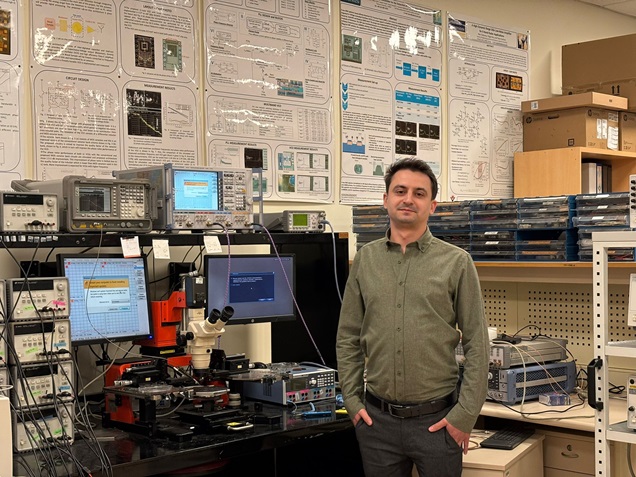
How did the education you received and the competencies you gained with the research and infrastructure opportunities offered at Sabancı University contribute to your professional and private life?
The point that impressed me the most at Sabancı University was its research-oriented approach and the appropriate infrastructure. The Microelectronics Research Group (SUMER) led by Prof. Dr. Yaşar Gürbüz had the necessary infrastructure for advanced chip characterization. In addition, thanks to the agreements with IHP Microelectronics in Germany, we had direct access to the world's fastest semiconductor technologies. In this way, I not only acquired theoretical knowledge, but also gained experience in designing, manufacturing, and characterizing chips with the latest technologies. This level of opportunity is only available at a limited number of universities worldwide, and Sabancı University is one of them.
Can you tell us about some examples of our graduates around you who have achieved success in the academic world or who have made a difference in the sector?
I can tell you about two successful graduates from my own field who graduated from Prof. Dr. Yaşar Gürbüz's research group. Tolga Dinç completed his doctorate at Columbia University. His doctoral studies have won many awards and have been published in the journal Nature Communications. It is very rare to publish in this journal in our field, and it is a great achievement for someone who has a master's degree in Turkey to achieve this during their doctoral studies. Another example is Samet Zihir. After completing his master's degree at Sabancı University, he completed his doctorate at the University of California San Diego. After graduating, he founded a chip design company in California in the field of high-frequency electronics. This company later became the foundation of the satellite communications group of Renesas, one of the world's giants. The success stories of such graduates, especially what Samet Zihir has achieved from my own perspective, have been a great source of inspiration for me.
How did your career path develop after graduating from Sabancı University?
After obtaining my master's degree in 2018, I started working as an RFIC Design Engineer at Silicon Radar in Germany. The reason I chose a small company was because I wanted to gain the necessary knowledge and experience faster for my dream of establishing a start-up from my high school years. Despite being 10 years old and having a team of 40 people, Silicon Radar was still managed with a start-up mentality. Thanks to the project management, design skills, and high-frequency chip characterization skills I gained during my master's studies at Sabancı University, I quickly took on many responsibilities. Thus, I gained the industrial design and project management experience necessary to establish a start-up in 6 years. At the same time, I completed my doctorate at Karlsruhe Institute of Technology to advance my theoretical knowledge and develop my research-oriented perspective. Thus, I had the opportunity to gain both academic and industrial experience.
Can we learn the story of your startup Milli IC GmbH?
In 2023, while I was still working at Silicon Radar, the company was acquired by US-based Indie Semiconductor. However, I started thinking about the gap created by the acquisition of small technology companies in Germany by large international companies and the opportunities this brought. I always had the idea of founding a startup, and these developments created a suitable ground for it. At this point, I would like to talk about where the name of the company came from. Because many people who are not interested in the subject ask how I convinced the Germans to use the name "milli (national in Turkish)". The story began in 2017, during the second year of my master's degree at Sabancı University. I went to a laboratory called milliLab in Finland to characterize a chip I designed. This name was formed with a fusion of the words millimeter-wave, which describes high-frequency electronics, and the word laboratory. At that time, we were joking with our friends in the SUMER group by pronouncing this word in Turkish because it was a word frequently used in Turkey. Later, during the Silicon Radar process, the name of my dream company became milliRadar. Since I didn't know where to establish it, it took shape in my mind as a strong name both in Turkish and internationally.
Meanwhile, the situation that emerged with the sale of Silicon Radar was also an important situation for VEGA, a company that developed industrial sensors using high-frequency radar and was one of the world leaders in this field. VEGA consulted with my supervisor Prof. Dr. Ahmet Çağrı Ulusoy at the Karlsruhe Institute of Technology, where I completed my doctorate, and exchanged ideas on how to meet its own design needs in this field. I had previously shared my ideas on these issues with my professor. At the same time, Alexander Haag, a doctoral student in my professor's group, was also thinking about a start-up idea on power amplifiers.
VEGA was interested both as an investor and a customer, so I, Alexander, Prof. Ulusoy, and VEGA decided to establish a company together. Initially, the company's name was listed as milliRadar in the notary documents because it was a very striking and memorable name for everyone in this field. However, just before the official application, we thought that the word "Radar" would unnecessarily narrow our scope of interest and decided that the word IC (Integrated Circuit) would be more appropriate instead. Thus, Milli IC was officially established in Germany in May 2024.
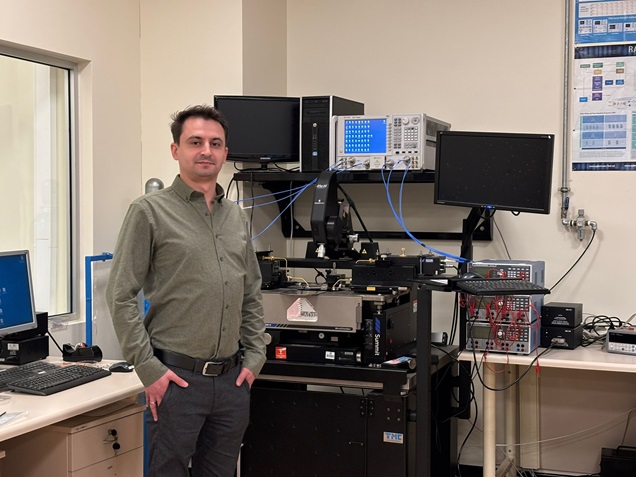
As an electronics engineer and successful entrepreneur in the sector, what do you think about the place and future importance of this profession in today's world and people's lives?
First of all, I would like to state that I am still only an entrepreneur and time will tell whether I am successful or not. Today is the information age and it is critical that information is delivered to everyone quickly, processed correctly and used for the benefit of humanity. Electronic engineers play a key role in this process and will continue to do so.
What can you say to our graduates about job opportunities in Turkey and abroad?
As Sabancı University graduates, you already know that you have received a very good education, have an international perspective and are equipped with good communication skills. Therefore, there is no goal that you cannot reach by working hard as long as you want. The important thing is to make the most of the opportunities you have, to constantly improve yourself and not to forget that you can realize your dreams by making the most of the opportunities.
What do you recommend to students who want to be entrepreneurs like you and want to start their own business?
First of all, those who want to be entrepreneurs need to understand the field of activity, technical requirements, industrial needs, and relations in the sector very well. It is not enough to have technical knowledge alone, it is also very important to understand the dynamics of the sector, customer expectations, and strategic decisions in the business world. In this context, I recommend that they get to know the sector closely by working in a position where they can develop themselves or in a small or medium sized company after graduation. Working in large corporate companies can also teach you many things, but you can have a broader perspective by taking direct responsibility in small and medium sized companies. I also believed in this approach and shaped my career in this direction. I can say that it works for now. Being patient, analyzing opportunities well, and taking risks at the right time are very important, and I think are the basic skills that turn an engineer into an entrepreneur. Over the last five years, I have listened to “The Gambler” by Kenny Rogers many times before making important decisions, when I was feeling like a failure, or when I was reaching my goals, and I still listen to it every day on my way to and from work. I would also recommend this song to friends who want to become entrepreneurs, because its messages about risk, timing, and decision-making are very similar to the entrepreneurial journey.
As you know, our university has completed 25 years. Could you share your views on the path our university has covered during this period and your dreams for its future?
25 years can be considered as the beginning of a university's history. However, the achievements and the level Sabancı University has reached during this period are truly impressive. If we extrapolate this development to the next 25 years, I believe that Sabancı University will be one of the few research universities in Europe that is recognized by everyone in its 50th year. However, my greatest wish is that external factors do not negatively affect this journey and that they are shaped in a way that will help the university reach its goals faster.
We thank you and wish you continued success.
Thank you very much. I would like to thank the GazeteSu team for their work and wish them continued success.

